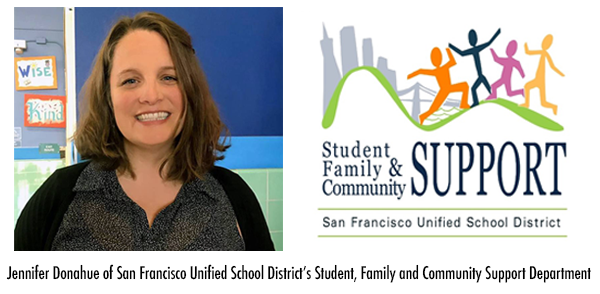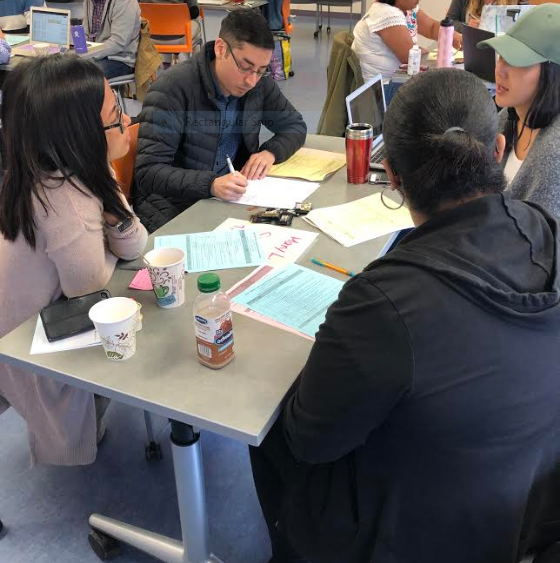
Our projects often bring us into schools to work directly with educators and students. An essential part of that work is forming partnerships with district and school staff, whose expertise and generosity strengthen our work. When we collect data in schools, our goal is to develop lasting partnerships that are mutually beneficial and enjoyable.
Jennifer Donahue has been a close partner of SRI’s Behavior Research team for many years. Jennifer is a program administrator at the San Francisco Unified School District’s Student, Family and Community Support Department. Her role includes hiring, training, and supervising school social workers, and she also supports programming development at school sites. We spoke with Jennifer about her experience supporting our team’s evaluations of social-emotional learning (SEL) programs in her district and what it’s like to participate in a researcher-practitioner partnership.
Note: responses have been edited for brevity/clarity.
How did you first get involved in a partnership with SRI?
The SRI researchers (Carl and Michelle) scheduled a meeting with our team and asked us what our district wanted to learn more about. We felt that there were gaps in training and support for providing social-emotional learning (SEL) to students, and we saw this project as an opportunity to address these gaps. We helped co-construct what the project would look like. This is the kind of partnership we wanted to see happen in our district.
What has it been like working with researchers at SRI, and what are the benefits to participating in researcher-practitioner partnerships?
“[Working with researchers at SRI] has been fantastic and one of the highlights of my work. It has truly been a partnership…”
The SRI researchers make sure to build in high-quality training and support that makes our work and partnership so sustainable. For example, the ongoing fidelity measurement makes us feel confident that our social workers are implementing the programs as intended, and it keeps us accountable to our work. Now we have social workers in our cohort who have become master trainers for programs, which makes it sustainable for us even when the grant ends.
“Once you have the experience of implementing an intervention with fidelity and you see the positive results, it helps you build trust in evidence-based curricula too… and it also makes them a little less intimidating because you know it works.”
We are a district that is very focused on what the research says, and being so closely involved with the researchers and having the research happen right on site is really valuable. It provides clear justification of our services to our district and stakeholders, because the research shows that the programs are working for our students.

“Our partnership also really expands our network and deepens our expertise.”
We are able to talk to people other than educators in our field, so that we can get perspectives from researchers and external experts in other professions. Because of the SRI researchers’ support and the relationships that they have within the research community, they introduce us to curricula we may not find easily and also provide us with great opportunities for professional growth. For example, we were able to meet program developers and have some of the best trainers in the country come and train our social workers. Our social workers really appreciate getting this kind of support and training around their professional development to bring high-quality programs to our students and families. We’ve also been able to go to conferences and present on the work we’ve done, which exposes us to other opportunities for growth.
What are potential challenges or drawbacks to researcher-practitioner partnerships and how can researchers effectively avoid or address these challenges?
Sometimes researchers who don’t work in school settings have unrealistic expectations.
“The SRI researchers really take our feedback about what is realistic and are thoughtful and creative in proposing solutions.”
Researchers need to have that ability to think very creatively or try things outside the norm. Sometimes researchers also do not provide the kind of support that practitioners need. The SRI researchers have been patient, compassionate, and understanding and go above and beyond to support our social workers. For example, while discussing the consent process for a project, our social workers expressed feeling nervous about answering questions and addressing concerns from parents. On the researcher end, it would be easy to think, “This isn’t such a big deal, why are you so nervous about this?” But right away, the SRI researchers provided their personal contact information to be “on call” if any issues came up. Our social workers felt so reassured to have this gesture of support.
What do you need to make a researcher-practitioner partnership work well?
One of the things that has helped our partnership to be really successful is that we had a lot of say in developing the content, goals, and questions of the research.
“The SRI researchers wanted to hear from us and were willing to be flexible.”
It is also important to build trust and be very clear about potential barriers and challenges, such as issues involving time or money. For this project with SRI researchers, it has been very beneficial for SRI to allocate funding to support our team’s work on the ground. It’s important for researchers to allocate resources and funding to support the work at schools because it takes a lot of time and effort.
What would you recommend to colleagues who are thinking about starting a partnership with researchers?
There need to be clear and mutual goals for the partnership and the project. You also need to establish trust by regularly meeting to build the collaborative relationship. In general, we meet with our SRI researchers on a weekly basis.
What do you feel like you need from researchers to sustain this partnership?
We have been working with our SRI researchers for almost 10 years and we’ve certainly grown together. I really appreciate their flexibility and ability to be responsive to what schools are looking for and want to learn more about.
In addition, researchers may have more access to funding opportunities that could benefit practitioners and their work. We’ve really appreciated that the SRI researchers look for such opportunities that we may not easily come across.
Anything else you want to say or mention?
I think it’s so important to build these positive researcher-school practitioner relationships. The SRI researchers are genuinely interested in what we are doing on the ground and how to best support us. We laugh a lot, get along very well, and have great discussions. Our social workers really appreciate the generous and supportive things that SRI researchers do—like making us individual kits with all of the necessary materials for a project… and also bringing tasty snacks to our meetings!
For more information about programs that SRI and SFUSD have collaborated on, please visit:
The information reported here was supported by the National Institute of Justice through Grant #2014-CK-BX-0015 to Phar-San Juan-Alamo Independent School District and SRI International. The opinions expressed are those of the authors and do not represent views of the National Institute of Justice.
Topics: Researcher-practitioner partnership
Tags: Collaboration District Partners Partnerships Stakeholders
